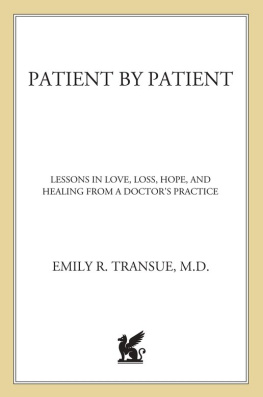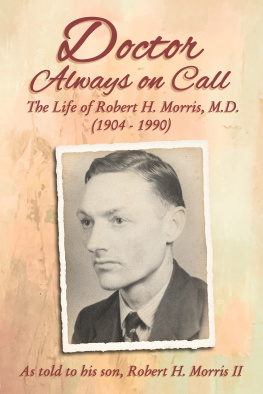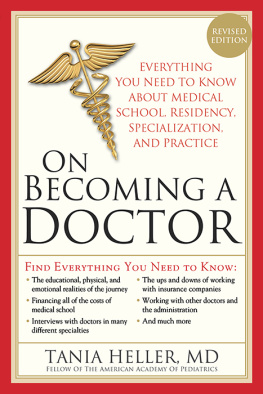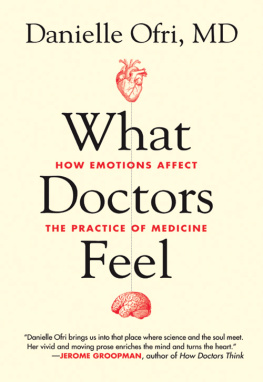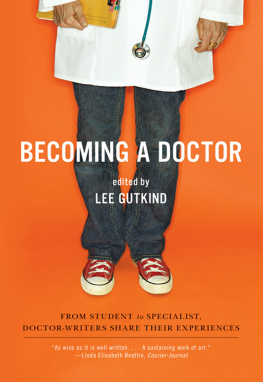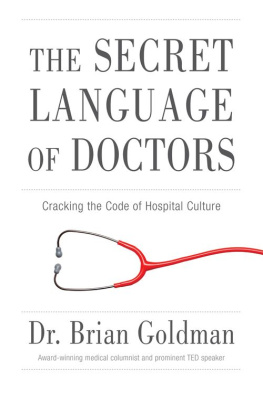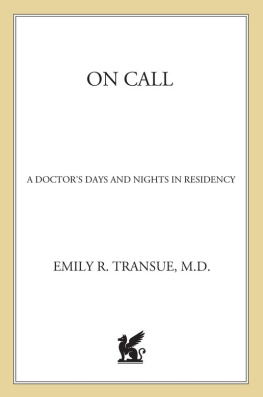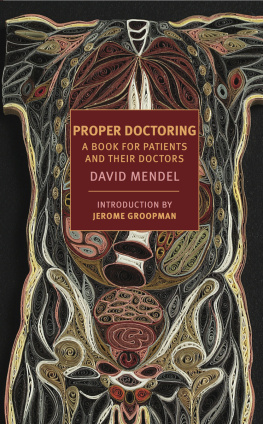acknowledgments
T here are many people I wish to thank for their help and support during the writing of this book.
First and foremost, I am deeply indebted to the patients I had the privilege to care forand learn fromduring internship and residency. Knowing you, if only briefly, has made all the difference.
My agent, Todd Shuster, knew I should write a book well before I did. I am grateful for his perseverance and faith.
I owe a tremendous debt of gratitude to my brilliant editor, Paul Elie, who had a clear vision for this book. I will never forget what he told me after the first round of editing. Thats a lot to do, he wrote, but its whats needed if the book is to be what it is meant to be. I also want to thank Pauls assistant, Cara Spitalewitz, for attending to so many important details during the course of this enterprise. And I am very grateful to Jonathan Galassi and John Glusman for giving me the opportunity to write the book in the first place.
Writing became a big part of my life during residency. For their contributions to my peculiar career path, I owe a special thanks to the writers and editors of the science section of The New York Times: Larry Altman, Laura Chang, David Corcoran, Erica Goode, Denise Grady, Gina Kolata, Barbara Strauch, and the late John Wilson. I am especially grateful to Cory Dean for encouraging me to write about residency and for reading an early draft of the manuscript.
My classmates at New York Hospital lived through the experience of internship and residency with me. I wish to recognize them for their hard work and dedication during that exciting and trying period in our lives. I am especially thankful to Sameer Rohatgi and Sung Lee for their friendship. I also want to thank my present colleagues at Long Island Jewish Medical Center, especially nurse practitioner John Meister, my assistants, Naidra Wilson and Karen Hinds, and my chiefs, Dr. Stacey E. Rosen and Dr. Stanley Katz. I am also grateful for the excellent and extraordinarily industrious cardiology fellows I work with. You make my job easy.
My writing groupThomas Estler, Bara Swain, and Danielle Ofriwas instrumental in motivating me to complete this book. I am especially indebted to Danielle, an accomplished physician-writer, for her innumerable helpful suggestions during the course of writing and for being such a wonderful role model. Two good friends also stand out for recognition: Ivan Oransky, a physician-editor who read an early draft of the manuscript, and Michael Berry, who proposed titles.
Of course, the narrative has relied on my memory of events that occurred almost a decade ago. If my memory has failed me, the fault is mine and mine alone.
I save my deepest gratitude for my family: my sister, Suneeta, and my mother, for their constant love and support; my brother, Rajiv, for his unflinching determination and for showing me the way; and my father, for all his pushing and prodding throughout my life. He was my first example of an author, and as much as I might not want to admit it, for good or bad, and in so many different ways, I am him. I also want to thank my wife Sonias family for their advice and support, especially my father-in-law, Madho Sharma, and my sister-in-law, Nina, a writer herself, who lovingly read through the manuscript and made countless helpful suggestions.
Being married to a doctor isnt easy, but being married to an ambivalent doctor can be particularly trying. I am grateful to my wife, Sonia, for being my life partner, for gracing me with a beautiful home, and for sticking by me through the difficult times. The book would not be what it is without her essential advice and support.
Finally, I want to recognize the sunshine of my life, my son, Mohan, who arrived as this project was taking off and provided the necessary pull away from it. He is my angel, a king, the court jesterall in one. I hope one day when he reads this book hell be proud of his dadda. Why do I love you so much? Just because!
CHAPTER ONE
escape
There is no short cut, nor royal road, to the attainment of medical knowledge. The path which we have to pursue is long, difficult, and unsafe.
JOHN ABERNETHY, ENGLISH SURGEON, HUNTERIAN ORATION , 1819
I had been an intern less than an hour, and already I was running late. The sloping footpath leading up to the hospital was paved with gray cobblestones. My feet ached as my oversize leather sandals slipped on the rounded irregular rocks. The hospital was an old building browned by the passage of two centuries, with spidery cracks in its faade. Founded in 1771, New York Hospital is the second-oldest hospital in the United States, a mecca for doctors and patients from all over the world. I had been in the building once before, six months ago, for a residency interview. I spun through a revolving brass door, nearly running into the burly security guard reading the New York Post. He looked up from the tabloid just long enough to point me in the direction of the elevator.
The tiled corridors were dark and dull, mixing shadow and light. I darted past the chapel, past the caf, around the information desk, which sat in the middle of the huge atrium like a fort, and entered a bank of elevators. Hanging on a wall was a portrait of a gray-haired lady in a blue dress sitting in dignified repose before an open book. She was a graduate of the medical school, class of 1899, ninety-nine years ago, who built a medical college for women in Northern India, on the banks of the Ganges, near where my father had his early college education. Nearby was a metal tablet in bas-relief: She cared for all in need. For each, she made time to guide, to teach, and to heal.
When I arrived on the fourth floor, other interns were still filing into the auditorium. A woman handed me a manila folder, and I went inside and sat down. The orientation packet contained several essential documents: a house-staff phone card, directions for obtaining autopsies, instructions on how to use the hospital dictation system, and the residency contract. I leafed through it quickly. My salary was going to be $37,000 a year, about eight dollars an hour, I calculated, given the number of hours I was going to be working, but I didnt mind. Though I was a year shy of thirty, it was more than double what I had ever made.
My classmates, though younger than I, appeared older than I expected, casually dressed, all thirty-five of them, in khakis and polo shirts, faded jeans and sequined tops. Some of them evidently knew each other, because they were already chatting in small, insulated groups. They were from some of the best medical schools in the country: Harvard, Yale, Cornell, Columbia. Though I too had gone to a top schoolWashington University in St. LouisI had been feeling insecure about the prospect of working with them. For months I had feverishly been reading Harrisons tome on internal medicine and review articles in The New England Journal of Medicine to prepare for this day.
Someone in the front row stood up and turned to face us. It was Shelby Wood, the hospitals residency director. He was a serious-looking man of medium build, with straight brown hair and a long, aquiline nose. He was wearing a white coat and a fat blue tie that might have been in fashion twenty years earlier. My elder brother, Rajiv, a cardiology fellow at the hospital, six years ahead of me in his medical training (though only two and a half years older), had warned me that Dr. Wood was a bit of a grouch, but had added that he was also fair and decent and a strong advocate for his house staff. Wood, I was to learn, hailed from the old school, where you were expected to live and breathe medicine, stay late in the hospital, neglect your family for the sake of your patients, and emerge on the other side a seasoned physician.


